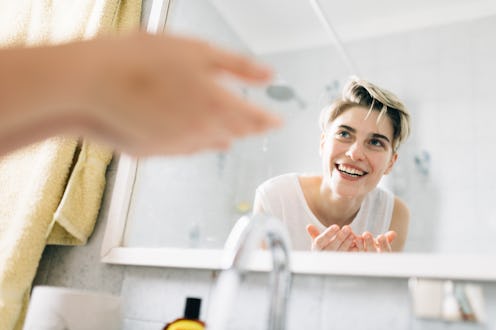Fashion
9 Things You Shouldn't Put On Your Skin

Maybe your skin isn't quite where you want it to be whether in terms of tone, texture, or health. But before you go adding new products or DIY treatments to your skincare routine, check out your current lineup first. Because you could be using something that you really shouldn't put on your skin. You may already know about certain ingredients to avoid in your skincare like parabens and phthalates, but what about some lesser-known ingredients, or even ones you thought were totally OK?
To narrow down what some of these hidden dangers are, I emailed with a few skincare experts. Diane C. Bailey, celebrity stylist, author, and SheaMoisture beauty ambassador; Dr. Elizabeth Tanzi, Founder and Director of Capital Laser & Skin Care and Assistant Clinical Professor of the Department of Dermatology at George Washington University Medical Center; and Joanna Vargas, Celebrity Facialist and Founder of Joanna Vargas Salon and Skincare Collection, all weighed in on what they would never put on their skin. So your skin stays as healthy as these experts, here are nine ingredients that you should probably keep away from your face. And remember that just because something seems natural or like a quick fix doesn't necessarily mean that it's good for your skin.
1. Synthetic Fragrances
According to Bailey, products with synthetic fragrances "often contain phthalates, which may have potential health risks." If you don't always want to go fragrance free though, she suggests looking for products that are scented with essential oils or natural extracts.
2. Synthetic Colors
Even though synthetic colors are pretty widely used in skin care products, "some synthetic colors can be derived from petroleum or coal tar sources," says Bailey. She explains that products with natural ingredients tend to vary in color because of the raw materials used, but this doesn't affect the efficacy, so you shouldn't worry about any color discrepancies when selecting products without synthetic coloring.
3. Propylene Glycol
"Propylene Glycol is a popular humectant that gives product slip, but also may cause skin irritation," says Bailey. You may notice this ingredient especially in lotions and moisturizers, so Bailey suggests looking for products with natural humectants such as shea butter, vegetable glycerin, and argan oil instead.
4. Baking Soda
Despite there being quite a few DIY skin care treatments that call for baking soda, Dr. Tanzi warns against using this ingredient: "Anything that can clean a sink or toilet has no place being used on the face." If you see a home remedy that calls for baking soda, try something else or see if there is a different ingredient that can be substituted.
5. Lemon
Similarly, lemons are sometimes also called for in DIY concoctions, but should probably be avoided. According to StyleCaster, lemons are so acidic that they could cause some serious irritation if the juice is applied to your skin. After all, if something can destroy the enamel on your teeth, it's probably way too strong for your face.
6. Sugar
Another DIY ingredient to be wary of is sugar. Even though sugar can make really nice scrubs for your body, the granules are just too rough for use on the face. In fact, most physical exfoliants can cause micro-tears and even leave your skin susceptible to inflammation and infection. So if you feel you need a nice scrub, try a chemical exfoliant instead.
7. Retin A
Although it is pretty popular for treating acne and aging skin, Retin A is something Vargas says she would never use. "It thins the skin and can cause an enormous amount of sensitivity," she explains. If you're curious about using retinoids in your skincare regimen, talk to your doctor or dermatologist to see what would work best for you.
8. Hairspray
In a pinch, some might use hairspray to set makeup if a proper setting spray isn't on hand. But it's better to just let your makeup melt off your face than to subject to all the harm that hairspray can cause. According to Cosmopolitan, the lacquers and alcohol that it contains will dry out your skin, while the repellants in it could irritate your skin, causing it to look red and bumpy.
9. Hot Water
While we may enjoy washing off in some scalding hot temps, hot water just isn't the best for your skin. Dermatologist Dr. Ava Shamban explains to Everydayhealth.com that hot water can dry out your skin, causing irritation. Especially if you already have dry, sensitive, acne-prone, or oily skin, it could only make your condition worse. So to keep your skin as healthy as possible, try to bathe in warm water instead of hot.
Images: Getty Images (10)